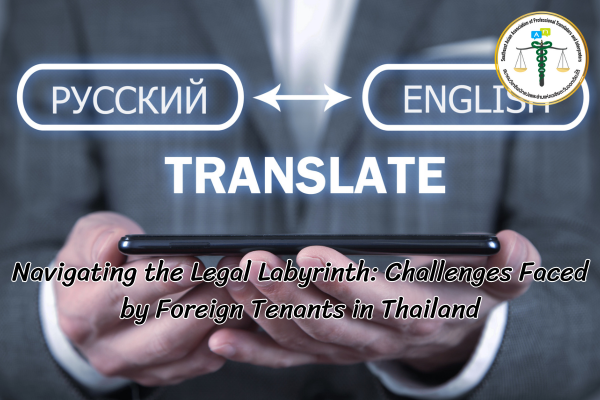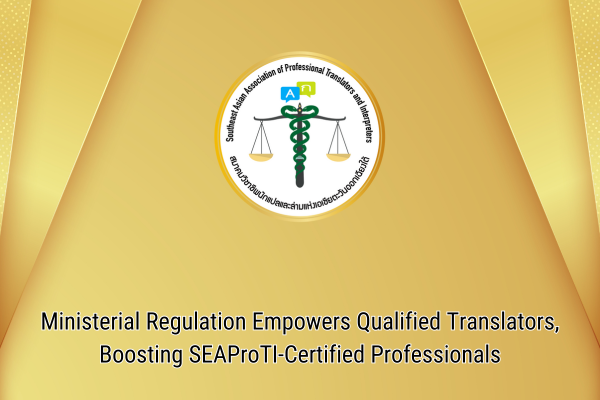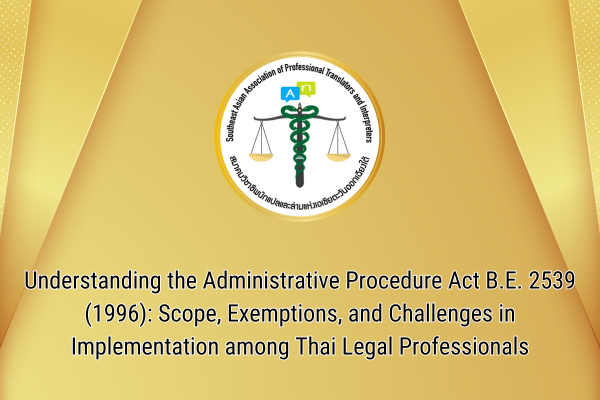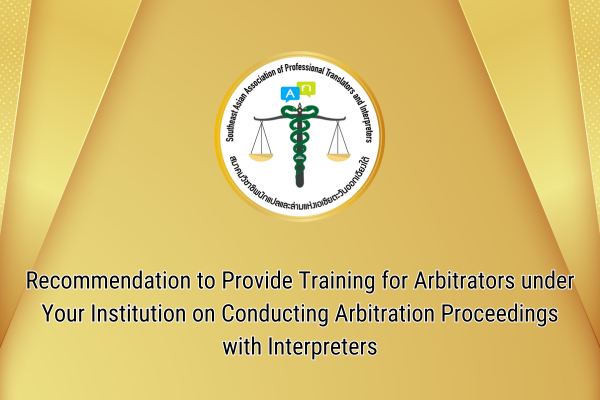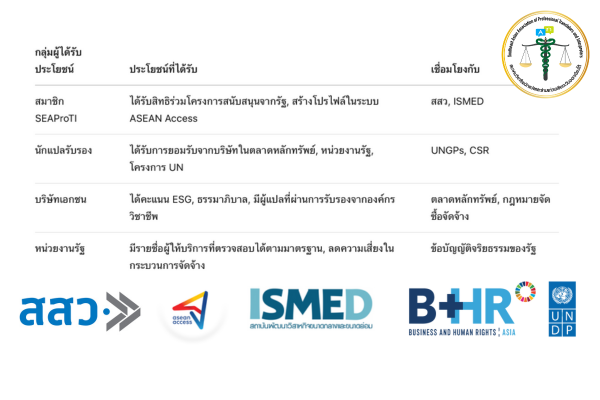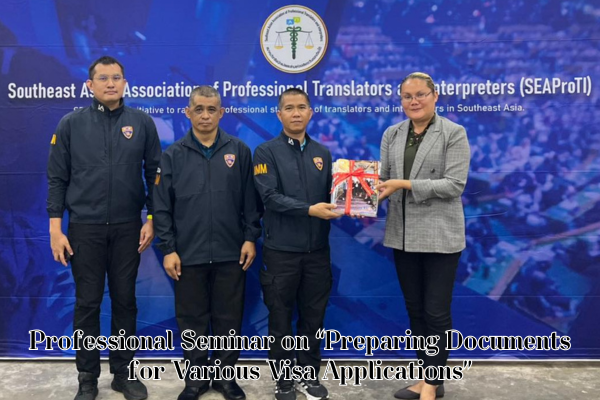Navigating the Legal Labyrinth:
Challenges Faced by Foreign Tenants in Thailand
27 December 2024, Bangkok – Thailand, with its vibrant culture and welcoming atmosphere, has become an increasingly popular destination for expatriates. However, navigating the legal landscape, particularly in the realm of property rental, can be a daunting task for foreign tenants. A confluence of factors, including differences in legal systems, linguistic and cultural barriers, and a lack of standardized practices, contribute to a complex environment where tenants can find themselves at a disadvantage. This article delves into these challenges, offering insights and recommendations for those seeking to rent property in the “Land of Smiles.”
Civil Law vs. Common Law: A Fundamental Divide
One of the primary challenges stems from the fundamental difference between Thailand’s civil law system and the common law system prevalent in many Western countries. While common law relies heavily on judicial precedent and interpretation, civil law is based on codified statutes. This means legal arguments and strategies effective in common law jurisdictions may not hold water in Thailand.
For instance, the concept of “case law,” where past court decisions influence future rulings, is less prominent in civil law.This can be disorienting for those accustomed to a system where legal outcomes are often shaped by previous judgments. Furthermore, the intricacies of Thai property law, embedded within the civil law framework, can be difficult to grasp for those unfamiliar with the system. As noted by New Stamford’s analysis of document translation complexities, “Thailand’s civil law framework can create loopholes that legally astute landlords exploit, leaving foreign tenants disadvantaged.”
The Language Barrier: Lost in Translation
The Thai language, with its unique script, tonal variations, and formal structure, presents a significant obstacle for foreigners. Misinterpretations in lease agreements are common due to inadequate translations, often leading to disputes and misunderstandings. Sawadee Translations, a language service provider, highlights that “language complexities and formal terminologies in Thai create ambiguities in contracts, often tilting the balance in favor of landlords.”
Crucially, the lack of standardized certification for legal translators exacerbates this issue. The Southeast Asian Association of Professional Translators and Interpreters (SEAProTI) is the only organization that operates a certification program for legal translators and interpreters in the region. However, awareness and utilization of this certification remain limited. Conference-Interpretation Asia notes, “The absence of qualified legal interpreters in Thailand often leads to misinterpretations, which landlords occasionally use to their benefit.”
This lack of standardization means tenants may unknowingly rely on translations that are inaccurate or incomplete, potentially leaving them vulnerable to unfavorable lease terms or disputes arising from misinterpretations.
Cultural Nuances and Power Dynamics
Beyond language, cultural nuances play a significant role in legal and interpersonal interactions in Thailand. The hierarchical nature of Thai society often discourages foreign tenants from challenging landlords, particularly when the latter are perceived as figures of authority. This power dynamic can make it difficult for tenants to assert their rights or negotiate fair terms.
Furthermore, the concept of “face” (saving face and avoiding confrontation) is deeply ingrained in Thai culture. This can lead to indirect communication styles that may be misinterpreted by foreigners. For instance, a landlord might express disagreement subtly rather than directly, which could lead a tenant to believe an issue has been resolved when it hasn’t.
This cultural context, combined with a legal system that may seem unfamiliar and complex, can create an environment where foreign tenants feel disempowered and vulnerable to exploitation.
Lack of Uniform Enforcement
Adding another layer of complexity is the lack of uniform enforcement mechanisms within the legal system. While laws exist to protect tenant rights, their enforcement can be inconsistent. This inconsistency can be leveraged by landlords with legal expertise, who may exploit loopholes or utilize delaying tactics to their advantage.
This lack of uniform enforcement further disadvantages foreign tenants who may already be struggling with language barriers and cultural differences. It can create a sense of uncertainty and make it difficult for tenants to predict outcomes or rely on the consistent application of the law.
Recommendations for Foreign Tenants
Navigating these challenges requires proactive measures and a clear understanding of the potential pitfalls. Here are some key recommendations for foreign tenants in Thailand:
- Consult a Lawyer: Before signing any lease agreement, seek legal advice from a qualified lawyer specializing in property law. They can review the contract, explain the terms in plain language, and ensure your rights are protected.
- Engage a Certified Translator: Use a reputable translation service with SEAProTI-certified legal translators to ensure accurate interpretation of all legal documents.
- Understand Your Rights: Familiarize yourself with basic tenant rights under Thai law. Resources like the SEAProTI website or legal aid organizations can provide valuable information.
- Document Everything: Keep thorough records of all communications and transactions with your landlord, including emails, letters, and payment receipts.
- Consider Using a Real Estate Agent: A reputable agent can help you navigate the rental market, negotiate fair terms, and act as a buffer between you and the landlord.
- Learn Basic Thai: While fluency is not necessary, learning basic Thai phrases can be helpful for everyday interactions and demonstrate your willingness to engage with the local culture.
- Be Respectful but Assertive: Understand the cultural emphasis on hierarchy and politeness, but don’t hesitate to assert your rights when necessary. Clear and respectful communication is key.
Conclusion
Renting property in Thailand can be a rewarding experience, offering access to a vibrant lifestyle and rich cultural immersion. However, it’s crucial to be aware of the potential legal and cultural challenges. By taking proactive steps, seeking professional advice, and understanding your rights, you can navigate the complexities of the Thai rental market with confidence and ensure a positive and secure tenancy experience.
About SEAProTI’s certified translators, translation certification providers, and certified interpreters:
The Southeast Asian Association of Professional Translators and Interpreters (SEAProTI) has officially announced the criteria and qualifications for individuals to register as “Certified Translators,” “Translation Certification Providers,” and “Certified Interpreters” under the association’s regulations. These guidelines are detailed in Sections 9 and 10 of the Royal Thai Government Gazette, issued by the Secretariat of the Cabinet under the Office of the Prime Minister of the Kingdom of Thailand, dated July 25, 2024, Volume 141, Part 66 Ng, Page 100.
To read the full publication, visit: the Royal Thai Government Gazette
พิชิตอุปสรรคทางกฎหมาย: อุปสรรคของผู้เช่าชาวต่างชาติในประเทศไทย
27 ธันวาคม 2567, กรุงเทพมหานคร – ประเทศไทย ด้วยวัฒนธรรมที่มีชีวิตชีวาและบรรยากาศที่อบอุ่น ได้กลายเป็นจุดหมายปลายทางยอดนิยมสำหรับชาวต่างชาติ อย่างไรก็ตาม การทำความเข้าใจกฎหมาย โดยเฉพาะอย่างยิ่งในเรื่องของการเช่าอสังหาริมทรัพย์ อาจเป็นเรื่องที่น่ากังวลสำหรับผู้เช่าชาวต่างชาติ ปัจจัยต่างๆ ที่ทำให้เกิดความซับซ้อน ได้แก่ ความแตกต่างของระบบกฎหมาย อุปสรรคทางภาษาและวัฒนธรรม และการขาดมาตรฐานการปฏิบัติ ซึ่งล้วนส่งผลให้ผู้เช่าตกอยู่ในสถานการณ์ที่เสียเปรียบ บทความนี้จะเจาะลึกถึงความท้าทายเหล่านี้ พร้อมนำเสนอข้อมูลเชิงลึกและคำแนะนำสำหรับผู้ที่ต้องการเช่าอสังหาริมทรัพย์ใน “ดินแดนแห่งรอยยิ้ม”
กฎหมายแพ่ง vs. กฎหมายจารีตประเพณี: ความแตกต่างที่สำคัญ
หนึ่งในความท้าทายหลักเกิดจากความแตกต่างพื้นฐานระหว่างระบบกฎหมายแพ่งของประเทศไทยกับระบบกฎหมายจารีตประเพณี (Common Law) ที่ใช้กันในหลายประเทศตะวันตก ในขณะที่กฎหมายจารีตประเพณีอาศัยหลักนิติ precedent และการตีความเป็นหลัก กฎหมายแพ่งจะยึดตามประมวลกฎหมายลายลักษณ์อักษร ซึ่งหมายความว่า ข้อโต้แย้งทางกฎหมายและกลยุทธ์ที่มีประสิทธิภาพในระบบกฎหมายจารีตประเพณีอาจใช้ไม่ได้ผลในประเทศไทย
ตัวอย่างเช่น แนวคิดของ “Case Law” ซึ่งคำพิพากษาของศาลในอดีตมีอิทธิพลต่อคำวินิจฉัยในอนาคต มีความสำคัญน้อยกว่าในกฎหมายแพ่ง ซึ่งอาจสร้างความสับสนให้กับผู้ที่คุ้นเคยกับระบบที่ผลลัพธ์ทางกฎหมายมักได้รับอิทธิพลจากคำพิพากษาในอดีต นอกจากนี้ ความซับซ้อนของกฎหมายทรัพย์สินของไทย ซึ่งฝังอยู่ในกรอบกฎหมายแพ่ง อาจเป็นเรื่องยากที่จะเข้าใจสำหรับผู้ที่ไม่คุ้นเคยกับระบบ ดังที่ New Stamford ได้วิเคราะห์ถึงความซับซ้อนของการแปลเอกสารว่า “กรอบกฎหมายแพ่งของประเทศไทยสามารถสร้างช่องโหว่ที่เจ้าของบ้านที่มีความรู้ทางกฎหมายสามารถใช้ประโยชน์ ทำให้ผู้เช่าชาวต่างชาติเสียเปรียบ”
อุปสรรคทางภาษา: หลงทางในโลกแห่งการแปล
ภาษาไทย ด้วยตัวอักษรที่เป็นเอกลักษณ์ เสียงวรรณยุกต์ที่หลากหลาย และโครงสร้างที่เป็นทางการ นับเป็นอุปสรรคสำคัญสำหรับชาวต่างชาติ การตีความผิดในสัญญาเช่าเป็นเรื่องปกติเนื่องจากการแปลที่ไม่เพียงพอ ซึ่งมักนำไปสู่ข้อพิพาทและความเข้าใจผิด Sawadee Translations ผู้ให้บริการด้านภาษา ได้เน้นย้ำว่า “ความซับซ้อนของภาษาและคำศัพท์เฉพาะทางในภาษาไทย ทำให้เกิดความกำกวมในสัญญา ซึ่งมักเอื้อประโยชน์ให้กับเจ้าของบ้าน”
ที่สำคัญคือ การขาดมาตรฐานการรับรองสำหรับนักแปลทางกฎหมาย ทำให้ปัญหานี้รุนแรงยิ่งขึ้น สมาคมนักแปลและล่ามมืออาชีพแห่งเอเชียตะวันออกเฉียงใต้ (SEAProTI) เป็นองค์กรเดียวที่ดำเนินโครงการรับรองสำหรับนักแปลและล่ามทางกฎหมายในภูมิภาค อย่างไรก็ตาม การรับรู้และการใช้ประโยชน์จากการรับรองนี้ยังคงมีจำกัด Conference-Interpretation Asia ระบุว่า “การขาดล่ามทางกฎหมายที่มีคุณสมบัติเหมาะสมในประเทศไทย มักนำไปสู่การตีความผิด ซึ่งบางครั้งเจ้าของบ้านก็ใช้เพื่อประโยชน์ของตน”
การขาดมาตรฐานนี้หมายความว่าผู้เช่าอาจไม่รู้ตัวว่ากำลังใช้การแปลที่ไม่ถูกต้องหรือไม่สมบูรณ์ ซึ่งอาจทำให้พวกเขาเสี่ยงต่อเงื่อนไขการเช่าที่ไม่เป็นธรรม หรือข้อพิพาทที่เกิดจากการตีความผิด
บริบททางวัฒนธรรมและพลวัตของอำนาจ
นอกเหนือจากภาษาแล้ว บริบททางวัฒนธรรมยังมีบทบาทสำคัญในการปฏิสัมพันธ์ทางกฎหมายและการติดต่อระหว่างบุคคลในประเทศไทย ลักษณะการเคารพผู้อาวุโสในสังคมไทยมักทำให้ผู้เช่าชาวต่างชาติไม่กล้าท้าทายเจ้าของบ้าน โดยเฉพาะอย่างยิ่งเมื่อเจ้าของบ้านถูกมองว่าเป็นบุคคลที่มีอำนาจ พลวัตของอำนาจนี้ อาจทำให้ผู้เช่ายากที่จะยืนยันสิทธิ์ของตนหรือเจรจาต่อรองเงื่อนไขที่เป็นธรรม
นอกจากนี้ แนวคิดเรื่อง “หน้าตา” (การรักษาหน้าตาและการหลีกเลี่ยงการเผชิญหน้า) ฝังรากลึกในวัฒนธรรมไทย ซึ่งอาจนำไปสู่รูปแบบการสื่อสารทางอ้อมที่ชาวต่างชาติอาจตีความผิด ตัวอย่างเช่น เจ้าของบ้านอาจแสดงความไม่เห็นด้วยอย่างละเอียดอ่อนแทนที่จะพูดตรงๆ ซึ่งอาจทำให้ผู้เช่าเชื่อว่าปัญหาได้รับการแก้ไขแล้วในขณะที่ยังไม่ได้รับการแก้ไข
บริบททางวัฒนธรรมนี้ เมื่อรวมกับระบบกฎหมายที่อาจดูไม่คุ้นเคยและซับซ้อน สามารถสร้างสภาพแวดล้อมที่ผู้เช่าชาวต่างชาติรู้สึกไร้อำนาจและเสี่ยงต่อการถูกเอาเปรียบ
การบังคับใช้กฎหมายที่ไม่สม่ำเสมอ
อีกหนึ่งความซับซ้อนคือ การขาดกลไกการบังคับใช้กฎหมายที่สม่ำเสมอภายในระบบกฎหมาย ในขณะที่มีกฎหมายเพื่อคุ้มครองสิทธิของผู้เช่า แต่การบังคับใช้กฎหมายเหล่านี้อาจไม่สอดคล้องกัน ความไม่สอดคล้องกันนี้สามารถใช้ประโยชน์โดยเจ้าของบ้านที่มีความเชี่ยวชาญด้านกฎหมาย ซึ่งอาจใช้ประโยชน์จากช่องโหว่หรือใช้วิธีการยืดเยื้อเพื่อประโยชน์ของตน
การบังคับใช้กฎหมายที่ไม่สม่ำเสมอนี้ ยิ่งทำให้ผู้เช่าชาวต่างชาติเสียเปรียบ ซึ่งอาจกำลังดิ้นรนกับอุปสรรคทางภาษาและความแตกต่างทางวัฒนธรรมอยู่แล้ว มันสามารถสร้างความรู้สึกไม่แน่นอนและทำให้ผู้เช่ายากที่จะคาดการณ์ผลลัพธ์หรือพึ่งพาการบังคับใช้กฎหมายอย่างสม่ำเสมอ
คำแนะนำสำหรับผู้เช่าชาวต่างชาติ
การรับมือกับความท้าทายเหล่านี้ จำเป็นต้องมีมาตรการเชิงรุกและความเข้าใจอย่างชัดเจนเกี่ยวกับข้อผิดพลาดที่อาจเกิดขึ้น นี่คือคำแนะนำที่สำคัญสำหรับผู้เช่าชาวต่างชาติในประเทศไทย:
- ปรึกษาทนายความ: ก่อนลงนามในสัญญาเช่าใดๆ ให้ขอคำแนะนำทางกฎหมายจากทนายความที่มีคุณสมบัติเหมาะสมซึ่งเชี่ยวชาญด้านกฎหมายทรัพย์สิน พวกเขาสามารถตรวจสอบสัญญา อธิบายข้อกำหนดในภาษาที่เข้าใจง่าย และรับรองว่าสิทธิ์ของคุณได้รับการคุ้มครอง
- ใช้บริการนักแปลที่ได้รับการรับรอง: ใช้บริการแปลที่มีชื่อเสียงพร้อมนักแปลทางกฎหมายที่ได้รับการรับรองจาก SEAProTI เพื่อให้แน่ใจว่าการแปลเอกสารทางกฎหมายทั้งหมดมีความถูกต้อง
- ทำความเข้าใจสิทธิ์ของคุณ: ทำความคุ้นเคยกับสิทธิขั้นพื้นฐานของผู้เช่าภายใต้กฎหมายไทย แหล่งข้อมูลเช่น เว็บไซต์ SEAProTI หรือองค์กรช่วยเหลือทางกฎหมาย สามารถให้ข้อมูลที่มีค่า
- บันทึกทุกสิ่ง: เก็บบันทึกการสื่อสารและธุรกรรมทั้งหมดกับเจ้าของบ้านของคุณอย่างละเอียด รวมถึงอีเมล จดหมาย และใบเสร็จรับเงิน
- พิจารณาใช้บริการตัวแทนอสังหาริมทรัพย์: ตัวแทนที่มีชื่อเสียงสามารถช่วยคุณสำรวจตลาดเช่า เจรจาต่อรองเงื่อนไขที่เป็นธรรม และทำหน้าที่เป็นตัวกลางระหว่างคุณกับเจ้าของบ้าน
- เรียนรู้ภาษาไทยเบื้องต้น: แม้ว่าไม่จำเป็นต้องพูดภาษาไทยได้คล่อง แต่การเรียนรู้วลีภาษาไทยพื้นฐานอาจเป็นประโยชน์สำหรับการปฏิสัมพันธ์ในชีวิตประจำวัน และแสดงให้เห็นถึงความตั้งใจของคุณที่จะมีส่วนร่วมกับวัฒนธรรมท้องถิ่น
- สุภาพ แต่อย่ายอม: ทำความเข้าใจถึงวัฒนธรรมการเคารพผู้อาวุโสและความสุภาพ แต่อย่าลังเลที่จะยืนยันสิทธิ์ของคุณเมื่อจำเป็น การสื่อสารที่ชัดเจนและให้เกียรติเป็นกุญแจสำคัญ
บทสรุป
การเช่าอสังหาริมทรัพย์ในประเทศไทย อาจเป็นประสบการณ์ที่คุ้มค่า ทำให้คุณได้สัมผัสกับวิถีชีวิตที่มีชีวิตชีวาและดื่มด่ำกับวัฒนธรรมอันรุ่มรวย อย่างไรก็ตาม สิ่งสำคัญคือต้องตระหนักถึงความท้าทายทางกฎหมายและวัฒนธรรมที่อาจเกิดขึ้น ด้วยการดำเนินการเชิงรุก ขอคำแนะนำจากผู้เชี่ยวชาญ และทำความเข้าใจสิทธิ์ของคุณ คุณจะสามารถรับมือกับความซับซ้อนของตลาดเช่าในประเทศไทยได้อย่างมั่นใจ และมั่นใจได้ถึงประสบการณ์การเช่าที่ดีและปลอดภัย
เกี่ยวกับนักแปลรับรอง ผู้รับรองการแปล และล่ามรับรองของสมาคมวิชาชีพนักแปลและล่ามแห่งเอเชียตะวันออกเฉียงใต้
สมาคมวิชาชีพนักแปลและล่ามแห่งเอเชียตะวันออกเฉียงใต้ (SEAProTI) ได้ประกาศหลักเกณฑ์และคุณสมบัติผู้ที่ขึ้นทะเบียนเป็น “นักแปลรับรอง (Certified Translators) และผู้รับรองการแปล (Translation Certification Providers) และล่ามรับรอง (Certified Interpreters)” ของสมาคม หมวดที่ 9 และหมวดที่ 10 ในราชกิจจานุเบกษา ของสำนักเลขาธิการคณะรัฐมนตรี ในสำนักนายกรัฐมนตรี แห่งราชอาณาจักรไทย ลงวันที่ 25 ก.ค. 2567 เล่มที่ 141 ตอนที่ 66 ง หน้า 100 อ่านฉบับเต็มได้ที่: นักแปลรับรอง ผู้รับรองการแปล และล่ามรับรอง


